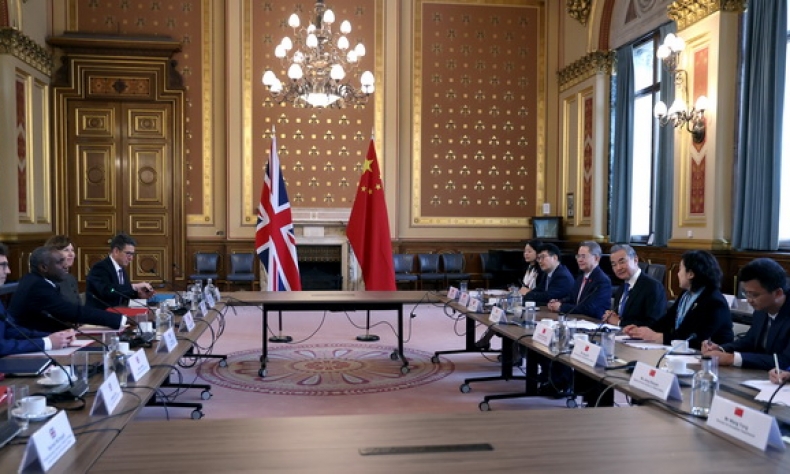Britain Must Chart Its Own Path Regarding China

Trump’s transactional approach to diplomacy is well known, and his willingness to sacrifice allies for short-term gains should serve as a warning to the UK.
U.S. President Donald Trump’s whirlwind first month in office has left both allies and adversaries in disbelief. From mass federal firings to disastrous “reciprocal” tariffs and challenges to international trade and political norms, Trump and his team have moved at breakneck speed to implement their policies, leaving a trail of uncertainty in their wake.
China has, unsurprisingly, been a major focus of Trump’s aggressive trade agenda. He has stacked his cabinet with China hawks, imposed 10 percent tariffs on all imports, and pressured countries such as Panama into abandoning the China-proposed Belt and Road Initiative. The Panama incident exemplifies just how far Trump is willing to coerce allies, as he attempts to drive a wedge between them and Beijing.
This spells bad news for countries like the UK, which risk being caught in the middle. Since returning to power last year, the new Labour government has taken significant steps to re-engage with China, seeking a pragmatic and mutually beneficial relationship that had been lacking under the previous administration.
Already this year, UK Chancellor Rachel Reeves has visited Beijing, coinciding with the restart of the UK-China Economic and Financial Dialogue. Reports suggest that the UK’s Environment Secretary is set to visit China in the coming months, while plans are also being drawn up for Prime Minister Keir Starmer to travel to Beijing. In turn, Chinese Foreign Minister Wang Yi visited the UK ahead of the Munich Security Conference, meeting with Starmer and Foreign Secretary David Lammy. Both sides agreed to deepen and expand cooperation in infrastructure, trade and investment, clean energy and other fields.
Given that strengthening UK-China relations has been a key foreign policy objective for Labour since returning to power, it would be reckless to allow Trump’s return to derail this progress. Britain must resist binary choices and instead maintain an independent, balanced foreign policy that serves its national interests.

Despite the so-called “special relationship,” Trump has shown little inclination to support the UK in his early days back in office. His tariffs are expected to further strain an already fragile UK economy, with borrowing costs rising due to increased U.S. government bond yields. Research by the Centre for Inclusive Trade Policy suggests that 20 percent across-the-board tariffs could lead to a £22 billion reduction in UK exports to the U.S., adding further pressure to economic growth.
By contrast, China remains one of the UK’s most important trading partners. Counting Hong Kong in, the annual bilateral trade between China and the UK has surpassed £110 billion ($139 billion) and the two-way investment stock is over £130 billion. The economic relationship spans financial services, manufacturing, higher education, and green energy, with many British businesses, universities, and industries dependent on Chinese investment. The recent UK-China Economic and Financial Dialogue unlocked greater market access for UK financial services and agricultural products, expected to boost the UK economy by £600 million over five years. At a time when economic growth is a pressing concern and stagnation looms elsewhere, fostering constructive ties with China is not just beneficial—it is essential.
While security concerns and strategic competition must be managed, disengaging from China or adopting an overly adversarial stance would be economically damaging for the UK. Post-Brexit, the UK has attempted to position itself as a global player, aiming to capitalise on opportunities in both Western and Eastern markets. To secure long-term prosperity, Britain must remain agile and independent in global affairs, rather than tethering itself exclusively to Washington’s geopolitical ambitions.
Trump’s transactional approach to diplomacy is well known, and his willingness to sacrifice allies for short-term gains—something Ukraine has already experienced—should serve as a warning to the UK. His proposed tariffs on steel and aluminium exports offer no benefit to UK industrial hubs such as Scunthorpe and Port Talbot, while additional levies will only harm the global economy, and by extension, the UK’s.
By contrast, China’s burgeoning middle class of 800 million presents an undeniable opportunity. Set to become the world’s largest consumer market by 2030, China’s rising consumption levels offer significant growth potential for UK services and luxury goods.
For too long, the UK’s foreign policy has been reactive and dictated by external pressures. Having voted to restore competence to government, the British public expects Labour to demonstrate the resolve needed to ensure Trump’s return does not derail efforts to build positive momentum in UK-China relations—momentum that could yield tangible benefits for both countries.
A strong, independent Britain must engage with all major economies on its own terms, and China should be no exception.
The article reflects the author’s opinions, and not necessarily the views of China Focus.
 Facebook
Facebook
 Twitter
Twitter
 Linkedin
Linkedin
 Google +
Google +







